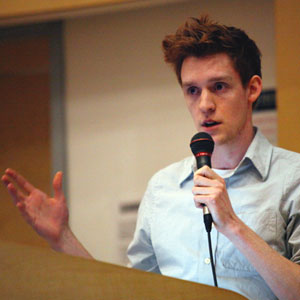 |
| Will Horne of the DSU's sustainability office says¬Ýthere are many good reasons for a ban on bottled water on campus.¬Ý(Bruce Bottomley Photo) |
Many Canadians don’t think about the water that flows so abundantly from their taps, the amount of water required to grow their food, or the water that it takes to produce one litre of bottled water (and yes, it takes more than that single litre).
The Forum on Water Issues, which took place in the Scotiabank Theatre on Monday, certainly highlighted a wide variety of shocking problems surrounding water.
Steve Mannell, director of the College of Sustainability, was the first of five speakers at the forum. He opened with some rather unnerving UN statistics on water.
A human needs 20 to 50 litres of water per day for drinking, washing and sanitation. Each human on earth uses an average of about 150 litres per day.
And Canadians are the most wasteful, using about 335 litres per day.
Then there is the production of food. The amount of food that a person consumes in one day takes 2,000 to 5,000 litres of water to produce.
Prof. Mannell also pointed out that it takes more than one litre of water to produce that one litre of bottled water. This is because it takes three to five litres of water just to make the bottle.
Graham Gagnon, Canada Research Chair in Water Quality and Treatment, spoke next. He discussed the change of water treatment over the years and Halifax Water’s recent increase in marketing and awareness.
Rochelle Owen, director of the ª∆…´÷±≤• Office of Sustainability, talked about the water situation on campus.
For the 2008-2009 year, ª∆…´÷±≤• used 1,268,636 cubic metres of water. If you consider a bathtub to be 60 litres, then that would be enough to fill more than 21 million bathtubs!
The Life Science Centre uses the most water, 31 per cent of the total. This is mostly due to the research being conducted there.
“We are tracking the total consumption and making changes and then tracking our reductions,” said Ms. Owen. “Right now we’re doing a major retrofit at the Life Sciences Centre and water is on the hit list. Early speculation says we’re going to save a lot of water in that retrofit, so I’m quite excited.”
She also says that they are looking at a central heating plant upgrade and some policy changes to make low-flow fixtures standard.
Will Horne, executive director of the ª∆…´÷±≤• Student Union Sustainability Office, raised the possibility of a bottled water ban.
He provided many reasons why a ban should be in place, from health and economics, to environmental and ethical considerations.
“We will be launching an awareness campaign to inform Dal students and staff about the many issues surrounding bottled water in the near future,” said Mr. Horne. “This is one area that we could use help from everybody with.”
Graham Carey, chair of the Green Residence Initiatives Panel, was the last speaker, addressing the issue to bringing change to ª∆…´÷±≤•‚Äôs residences. In short, it‚Äôs a challenge, said the fourth-year physics and chemistry major. Although residences bring together a large number of students, they tend to be hard to reach. While there are a lot of networks in place to disperse information and programs to students through res, there is also a high level of apathy.
Mr. Carey helped initiate the first ever Eco Olympics last year and the second annual one is currently underway. It is a competition between residences to reduce consumption of electricity, water and waste. The Water Forum actually took place on the same day that the water reduction challenge kicked off.
Dal residences are now competing to see who can reduce their water consumption the most.
